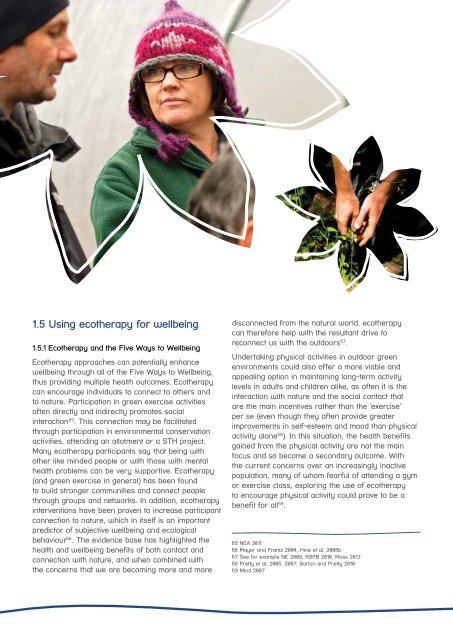16 <str<strong>on</strong>g>Ecominds</str<strong>on</strong>g> <str<strong>on</strong>g>effects</str<strong>on</strong>g> <strong>on</strong> <strong>mental</strong> <strong>wellbeing</strong>1.5 Using ecotherapy for <strong>wellbeing</strong>1.5.1 Ecotherapy and the Five Ways to WellbeingEcotherapy approaches can potentially enhance<strong>wellbeing</strong> through all of the Five Ways to Wellbeing,thus providing multiple health outcomes. Ecotherapycan encourage individuals to c<strong>on</strong>nect to others andto nature. Participati<strong>on</strong> in green exercise activitiesoften directly and indirectly promotes socialinteracti<strong>on</strong> 65 . This c<strong>on</strong>necti<strong>on</strong> may be facilitatedthrough participati<strong>on</strong> in envir<strong>on</strong><strong>mental</strong> c<strong>on</strong>servati<strong>on</strong>activities, attending an allotment or a STH project.Many ecotherapy participants say that being withother like minded people or with those with <strong>mental</strong>health problems can be very supportive. Ecotherapy(and green exercise in general) has been foundto build str<strong>on</strong>ger communities and c<strong>on</strong>nect peoplethrough groups and networks. In additi<strong>on</strong>, ecotherapyinterventi<strong>on</strong>s have been proven to increase participantc<strong>on</strong>necti<strong>on</strong> to nature, which in itself is an importantpredictor of subjective <strong>wellbeing</strong> and ecologicalbehaviour 66 . The evidence base has highlighted thehealth and <strong>wellbeing</strong> benefits of both c<strong>on</strong>tact andc<strong>on</strong>necti<strong>on</strong> with nature, and when combined withthe c<strong>on</strong>cerns that we are becoming more and moredisc<strong>on</strong>nected from the natural world, ecotherapycan therefore help with the resultant drive torec<strong>on</strong>nect us with the outdoors 67 .Undertaking physical activities in outdoor greenenvir<strong>on</strong>ments could also offer a more viable andappealing opti<strong>on</strong> in maintaining l<strong>on</strong>g-term activitylevels in adults and children alike, as often it is theinteracti<strong>on</strong> with nature and the social c<strong>on</strong>tact thatare the main incentives rather than the ‘exercise’per se (even though they often provide greaterimprovements in self-esteem and mood than physicalactivity al<strong>on</strong>e 68 ). In this situati<strong>on</strong>, the health benefitsgained from the physical activity are not the mainfocus and so become a sec<strong>on</strong>dary outcome. Withthe current c<strong>on</strong>cerns over an increasingly inactivepopulati<strong>on</strong>, many of whom fearful of attending a gymor exercise class, exploring the use of ecotherapyto encourage physical activity could prove to be abenefit for all 69 .65 NEA 201166 Mayer and Frantz 2004, Hine et al, 2008b67 See for example NE 2009, RSPB 2010, Moss 201268 Pretty et al, 2005, 2007; Bart<strong>on</strong> and Pretty 201069 Mind 2007
An evaluati<strong>on</strong> for Mind 17Taking notice of the envir<strong>on</strong>ment around us,particularly if it is a natural envir<strong>on</strong>ment can haveimportant benefits for health and <strong>wellbeing</strong> 70 .Nature and green spaces are perceived as placesto relax, escape and unwind from the daily stressesof modern life and can have positive influences <strong>on</strong><strong>wellbeing</strong>. Furthermore, the more frequent the visitsto natural spaces the lower the incidence of stress 71 .Noticing the natural envir<strong>on</strong>ment is also likely toincrease c<strong>on</strong>necti<strong>on</strong> to nature, for example feelingsof c<strong>on</strong>nectedness to nature <strong>report</strong>ed after wildernessexperiences range from the aesthetic appreciati<strong>on</strong> ofbeautiful scenery and landscapes to a deep sense ofbel<strong>on</strong>ging to the natural world. In this c<strong>on</strong>text naturec<strong>on</strong>necti<strong>on</strong> has also been taken to include feelings ofpeacefulness and harm<strong>on</strong>y; a sense of timelessness;creati<strong>on</strong> of a sense of vulnerability which is humbling;learning a respect for nature and developing a senseof place 72 . People should therefore be encouraged toaccess and take notice of nature as far as possible,as this is likely to have substantial c<strong>on</strong>sequences fortheir health and <strong>wellbeing</strong>.Many ecotherapy approaches encourage and enableparticipants to learn something new, develop newskills and increase healthy and envir<strong>on</strong><strong>mental</strong>lyfriendly behaviours, thus c<strong>on</strong>tributing to increased<strong>wellbeing</strong>. Whether this new knowledge is growingfruit and vegetables, learning bushcraft skills orsimply taking part in a new activity, it all has thepotential to enhance <strong>wellbeing</strong> through learning.Similarly, many green exercise activities also enableindividuals to give to others. This may be throughgrowing food <strong>on</strong> an allotment for the community;building a community natural area or helping othersachieve goals through a shared green exercise group.In additi<strong>on</strong> some ecotherapy interventi<strong>on</strong>s (particularlyenvir<strong>on</strong><strong>mental</strong> c<strong>on</strong>servati<strong>on</strong> and ecotherapy) alsoencourage individuals to give something back t<strong>on</strong>ature either directly through direct tasks or indirectlythrough envir<strong>on</strong><strong>mental</strong>ly friendly behaviours.Ecotherapy can c<strong>on</strong>tribute both directly and indirectlyto <strong>wellbeing</strong> and therefore can facilitate each of theFive Ways to Wellbeing. Incorporating more greenexercise activities into daily routines and lifestyles andsupporting more ecotherapy opportunities has thepotential to increase <strong>wellbeing</strong> for both individuals andcommunities alike.1.5.2 Wellbeing and the envir<strong>on</strong>ment - linkingenvir<strong>on</strong><strong>mental</strong> enhancement and c<strong>on</strong>servati<strong>on</strong> activitiesLeading <strong>on</strong> from the Five Ways to Wellbeing, therehas been a growing recogniti<strong>on</strong> of the multiplehealth and <strong>wellbeing</strong> impacts of c<strong>on</strong>tact with naturein a range of different settings and c<strong>on</strong>texts. Arecent piece of research by the European Centrefor Envir<strong>on</strong>ment and Human Health, University ofExeter Medical School and the Peninsula TechnologyAssessment Group (which included a systematicreview 73 ) examined a wide variety of differentquantitative and qualitative studies of people takingpart in envir<strong>on</strong><strong>mental</strong> activities. From this research,a model has been developed which illustratesthe pathways through which multiple health and<strong>wellbeing</strong> impacts may occur for those participatingin envir<strong>on</strong><strong>mental</strong> enhancement and c<strong>on</strong>servati<strong>on</strong>activities. Although specifically developed forenvir<strong>on</strong><strong>mental</strong> enhancement and c<strong>on</strong>servati<strong>on</strong>activities the model could also be adapted for andapplied to other nature based interventi<strong>on</strong>s and mayprovide a useful framework for several ecotherapyapproaches (see Box 2).1.5.3 Ecotherapy and healthy life pathwaysC<strong>on</strong>tact with nature does not <strong>on</strong>ly affect immediatehealth and <strong>wellbeing</strong> but also can also affect healththroughout a lifetime. There is growing evidence toshow that c<strong>on</strong>tact with nature and c<strong>on</strong>sequent levels ofphysical activity in childhood affects not <strong>on</strong>ly <strong>wellbeing</strong>at the time but also in later life 74 . Many of the socialand envir<strong>on</strong><strong>mental</strong> c<strong>on</strong>diti<strong>on</strong>s of childhood can predictor track adult health status and childhood physical and<strong>mental</strong> ill-health is carried forward in later life 75 . Lateremoti<strong>on</strong>al <strong>wellbeing</strong> and cognitive capacity is alsoprofoundly influenced by early social development 76 .In the same way childhood experiences innature appear to fix envir<strong>on</strong><strong>mental</strong> sensitivity (apredispositi<strong>on</strong> to be interested in learning about caringfor and c<strong>on</strong>serving nature 77 ) in adults, suggesting aneed to establish good behaviours early 78 .70 Mitchell and Popham 2008; Hine et al 201171 Cooper-Marcus and Barnes 1995; Whitehouse et al 2001; Ulrich 2002-72 Russell et al. 1998; Russell 1999, 2001; Russell et al, 2000; Caulkins et al.2006; Hine et al 200973 Husk et al 201374 Wells and Lekies 2006, Frenn et al 2005, Pretty et al 201075 Danner et al 2001, Foresight 200876 Ainsworth and Bell 1970, Ainsworth et al. 197477 Chalwa 199878 Chawla and Cushing 2007, Cheng and M<strong>on</strong>roe 2010, Ernst and Theimer 2011



